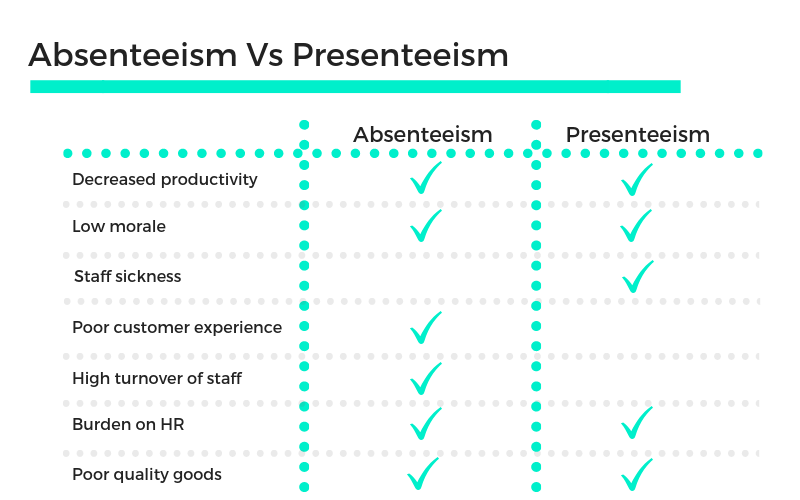It’s the question that HR officers and managers have been debating over their cheese sandwiches since the phrases were first coined: Absenteeism Vs Presenteeism: Which is Worse?
In many businesses, there is a healthy culture where people who are sick have time off to get well and it isn’t seen as a badge of honour to work through the flu. The workload is evenly distributed and manageable, yet still challenging, staff are happy and attendance is good.
In other businesses, however, there seem to be two types of staff: those who are never there, and those who are burning out carrying the load.
In other words, those who are practicing absenteeism, and those suffering through presenteeism.
What is Absenteeism?
Absenteeism is when a staff member always seems to be off work.
Maybe they have family commitments, a recurrent chest infection, or a sudden and curious onset of illness every Monday morning. Either way, they have a disproportionately high absence rate.
What causes Absenteeism?

It is important to stress that not everyone with a high absence rate is skiving.
Absenteeism can occur when a person is struggling with their physical or mental health, either acutely or chronically.
Or, maybe they have a child or elderly relative who is suffering and needs care.
Worryingly though, absenteeism can present itself when the individual is stressed, overworked, or dissatisfied with their job.
You might occasionally get a person who just wants longer weekend, but it is generally safe to assume that if a member of staff is practicing absenteeism, there is an underlying factor.
Have a look here at how to spot and treat absenteeism.
What is Presenteeism?
Presenteeism is where staff work more hours then are required or through sickness.
This might not seem too bad to a business owner trying to maximise productivity, but those practicing presenteeism are often far less productive than those who work their usual hours. Plus, they are bringing germs into the office, putting everyone at risk.
What Causes Presenteeism?

Presenteeism is often caused by the workplace culture or the individual’s workload.
Some workplaces have a high pressured, unforgiving culture where the person who send the latest email in the day is applauded.
Or perhaps your workplace doesn’t pay for sick leave beyond the statutory requirements and has a sensitive disciplinary procedure for absences.
Often, it can be as simple as having a dedicated employee whose workload is overwhelming, or an ambitious employee who wants to climb the ladder.
Whatever the cause, the result can be a stressed and disillusioned employee who is looking for another job and a bad reputation for your business.
But Which is Worse? Absenteeism Vs Presenteeism?
Have a look at the impact absenteeism and presenteeism can have on key areas of your business in this absenteeism vs presenteeism comparison chart.
Can We Help?
Whether you have a problem with Absenteeism, presenteeism, or both it is time to take action.
Here at Wellspace we are experts in workplace wellness, including stress management and improving the overall health and happiness of your staff.
Have a look at our corporate wellness solutions page here to find out how we do it, or get in touch on info@yourwellspace.com or call us on 0808 178 0748.











